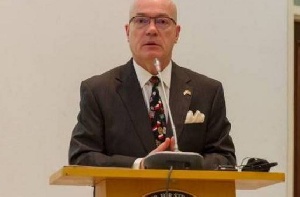The US Ambassador to Ghana, Mr Robert Jackson, has bemoaned the alarming rate of corruption, saying it is destroying the fibre of society.
According to him, “this pervasive corruption directly impacts some of the areas that are most critical to Ghana’s growth and development.”
Speaking during the launch of a survey report titled: “Corruption is Eating us up: A Call to Action,” Mr. Jackson noted as a result of the arson at the Central Medical Stores in 2015, which appeared to have “been ignited to cover up corruption,” the US government is unable to “support public health in Ghana.”
He described the decision as a “major blow” to the West African nation.
Over $80 million worth of medical supplies and drugs, including $7 million in donations from the American people were destroyed in the blaze.
“Corruption kills and robs,” Mr. Jackson stated, noting that “When a medical practitioner fails to appear at the government clinic to be at the private clinic, those dependent on the government clinic suffer. When a teacher demands sexual favours to award better grade, he is committing a crime. When one has to wait weeks for a passport or a driving licence, one’s income can be affected. These are all forms of corruption or mismanagement or both.”
He called on the government to strengthen its fight against corruption.
The survey was undertaken by the consortium of three civil society organisations working to implement a four-year project called, “Accountable Democratic Institutions and Systems Strengthening (ADISS) in 50 districts across the country”.
The consortium is made up of the Ghana Integrity Initiative (GII), the Ghana Anti-Corruption Coalition (GACC) and SEND-Ghana. The United States Agency for International Development (USAID) is funding the project.
Highlights
Presenting highlights of the survey report, the Country Director of SEND-Ghana, Mr George Osei-Bimpeh, said while about 90 per cent of respondents surveyed associated bribery with corruption, fewer respondents had an appreciation of the forms of corruption.
Thus, nepotism for instance was not associated with corruption except by respondents with a high level of education.
On conflict of interest, the results also showed that respondents with a higher level of education associated the vice with corruption, while those with a lower level of education did not think it was a corrupt act.
Most respondents, also did not think that the payment of facilitation fees was a bribe.
Independent institutions of state with anti-corruption functions were also not trusted to fight corruption, with the police, political parties and the judiciary ranking as institutions perceived as extremely corrupt.
Institutions most trusted in the fight against corruption were the Central Government, the media and NGOs, with the Commission on Human Rights and Administrative Justice placing fourth.
General News of Thursday, 9 March 2017
Source: starrfmonline.com













